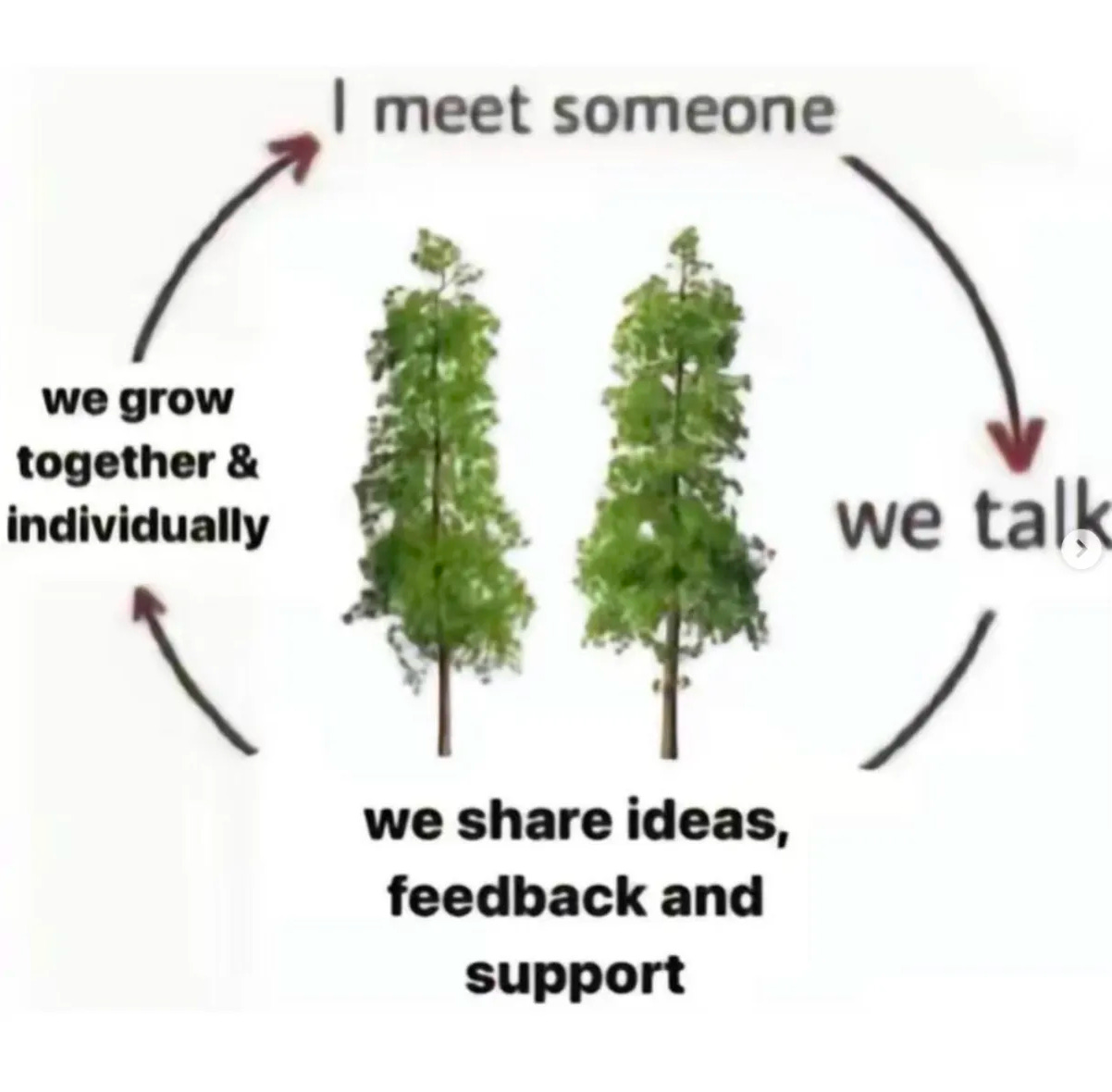I love thinking of ideas like they’re babies — a bit fragile, definitely impressionable, and if raised well, they can go far. Every week for two years, I’ve spent 10+ hours working with peoples’ baby ideas.1 The process gotten more elegant and effective over time.
I’m reminded of this blurb on Bell Lab’s most generative researchers:
After crunching a lot of data, they found that the only thing the productive employees had in common was that "workers with the most patents often shared lunch or breakfast with a Bell Labs electrical engineer named Harry Nyquist. It wasn't that Nyquist gave them specific ideas. Rather, 'he drew people out, got them thinking’”
There are certain people, like JZ and PA, who also wield this skill like black magic.2 They say the right combo of words and you leave imagining your ideas bigger and better than they were.3 The following is my best effort to multiply these force multipliers.4
every idea i’ve had is a frankensteinian cobbling of other people’s brains
How do you become someone people want to share their dreams with?
step 0: the start line
To be effective, you have to be opinionated. Not by way of ideological stubbornness, but by being engrossed enough with your own thing to develop mental models about how things should work.5 You have intuitions informed by actually interacting with the world. If they wanted the same 6 internet opinions, they would scroll somewhere.
You also have to know your place. You have to believe that they already contain great ideas, and that with a few pointed questions, you can pull it out of them.6
The job, really, is to be interested, attentive, and excited. It’s very hard to fake true enthusiasm — people can smell it.
step 1: actually being helpful
Not a lot of people do this because it takes effort. Doing this at all, will make you stand out.
Making helpful introductions to collaborators, mentors, teammates
PA is hilariously good at this. He will have 2 introductions tee-ed up as you finish describing your idea.
Sitting down and doing a (solicited) feedback session
Sharing links to relevant resources, opportunities, and applications
High-fiving them for their wins (sometimes you may have to prompt them to share)
Messaging them about how their work affected you, or that something reminded you of them
step 2: enforce rigor without being a certified weighted blanket
So what happens when you don’t think the idea is that good or could be more precise? A bad friend would let it slide, but we’re also not trying to shut down ideas. My response (and hot take) is that criticism rarely has the desired effect and is best reformulated into questions.
Out: That color palette doesn’t look good
In: What references are you using for colors? What are you trying to do with them? How does this achieve it?
The ensuing dialogue embeds humility and produces better results. I also like to use the qualifier: “If it were exactly me in your shoes, I would change ___”.
step 3: induce the best by expecting it
People also choose who to go to based on how they feel they are seen. I’ve seen it referred to it as inverse charisma.
I’ve had professors that clearly love the content, but seem to hate the students. Every 3 sentences are a dig on the generations’ laziness and inability to socialize effectively. Then why are you here!! It’s no surprise that attendance dwindles — nobody wants to be seen that way. On the flip side, a blurb on Manuel Blum, computer scientist turned legendary academic advisor:
He imparted to his students a sense of pedagogical responsibility: he was really expecting to learn from them at every weekly meeting, which in turn meant they had to understand their ideas to the bone.
He’s paying them the scarcest resource: attention. Blum’s students are being listened to with so much intensity that they have to be their sharpest self. Assigning this value to baby ideas gives them something to grow into, a self-fulfilling prophecy of sorts.
People like BM, HN, AL, and BT have a similar, but different effect on me. Their latent ambition is contagious, you just want to do better because that’s what they expect from themselves.
step 4: the most important part (not clickbait)
The most important, is that your conversation encourages them to try. Identify reasons why you are grateful that they, in particular, are thinking about it. Tell them their ambitions are justified, that you feel like it is in good hands because they are working on it. If you can’t immediately find the reasons why, excavate deeper.
Only by doing, even small iterations, will we know if an idea actually has teeth. I leave you with this:

And a thanks to JZ, the blueprint of the ideal thought partner, and to AL, JT, and MX for their thoughts.
Someone mentioned to me recently that everything I write is a love letter to people in my life. Surprise! This one is the same.
A model of someone I want to emulate, someone that has achieved personal excellence but also playing a critical hand in the development of future stars. John McPhee, Bob Paine, John Archibald Wheeler, and Manuel Blum come to mind.
Every time I write something like this I feel like I’m showing people all my little tricks.
If you very clearly have your own thing, you’re also less likely to “take” their idea. Which is an important trait to some (h/t DZLZ)
Note the emphasis on pulling out vs shutting things down.





this is a high quality post
wow this spoke to me so deeply. i had never been able to articulate what i think it is i do best in a way that wasn’t just “consult.” this is sooo cool thank u for writing this!!